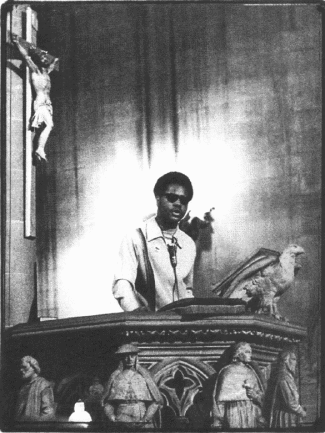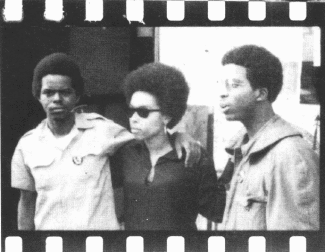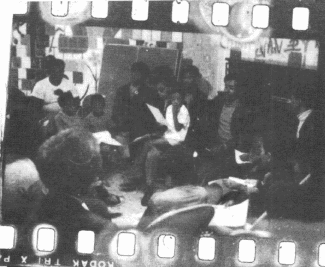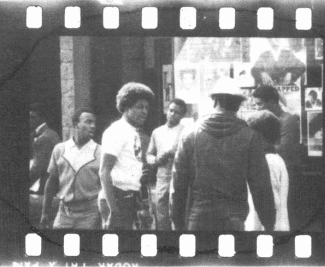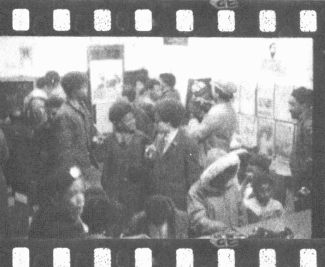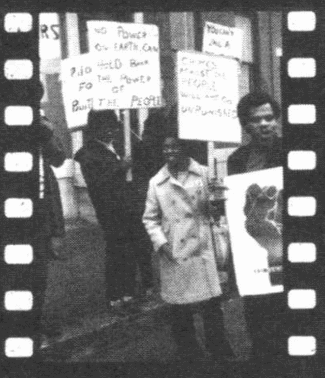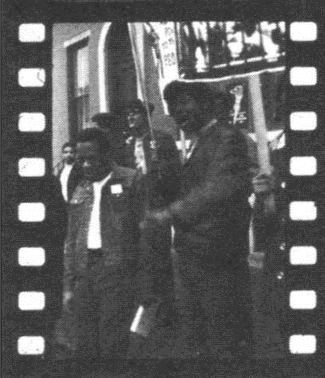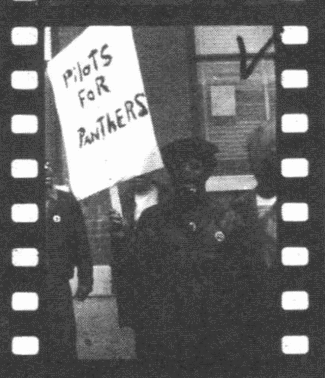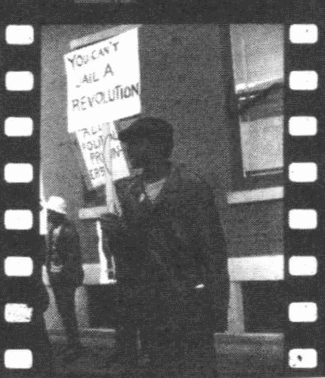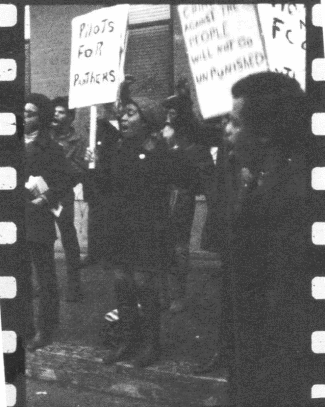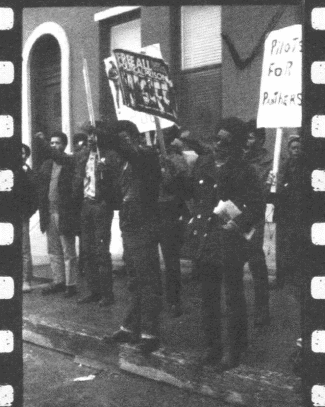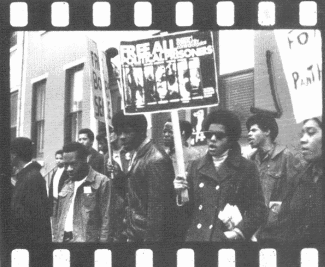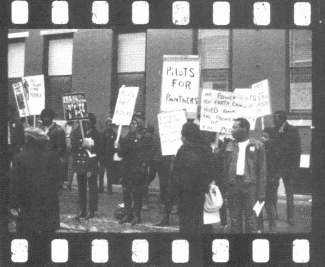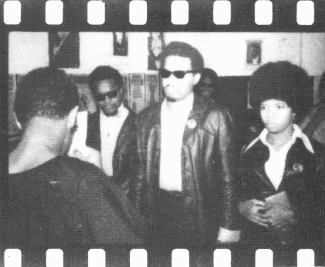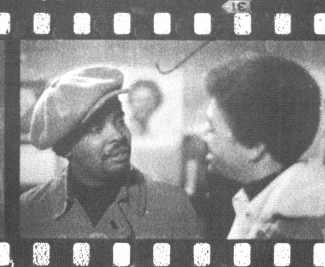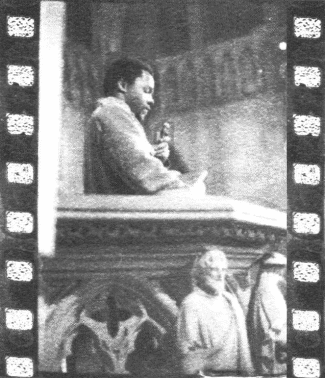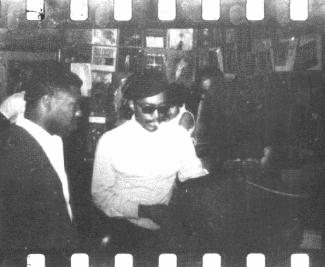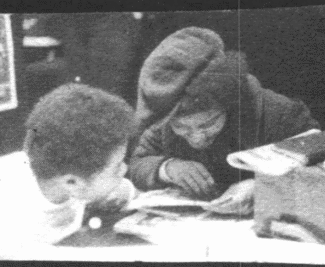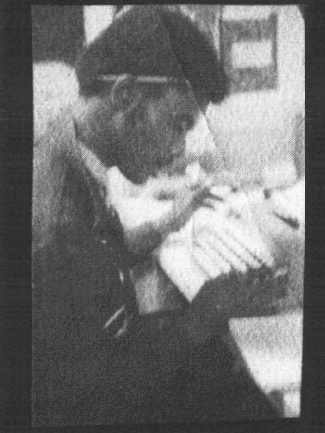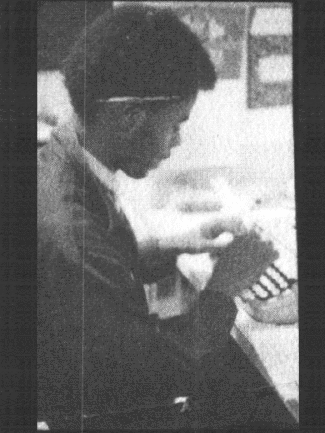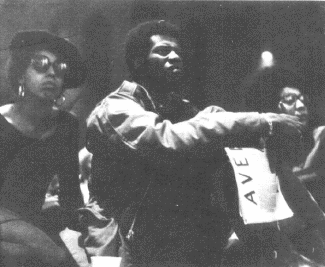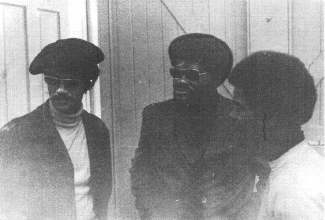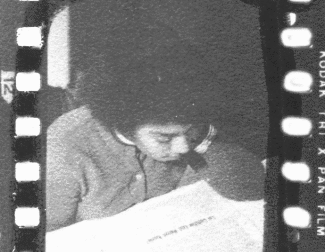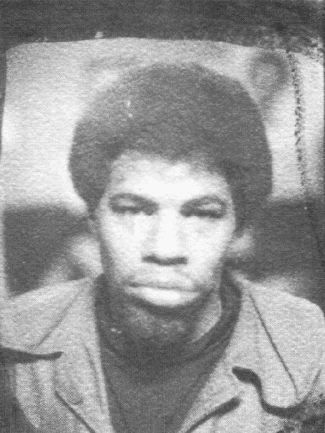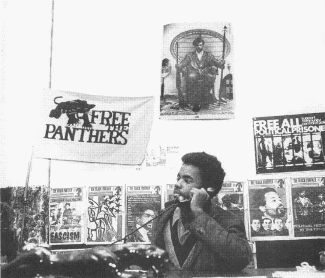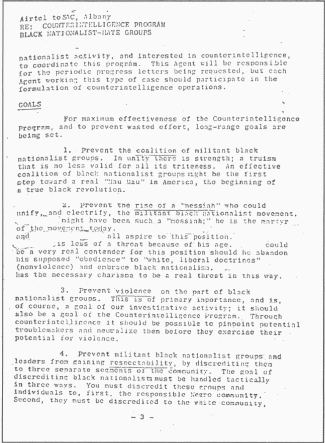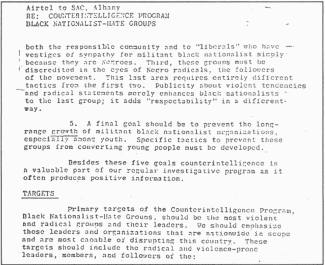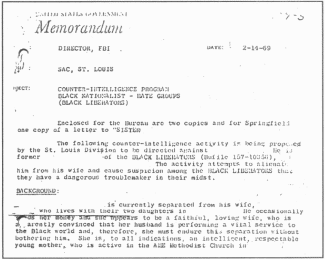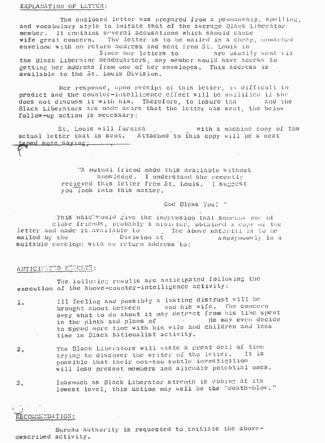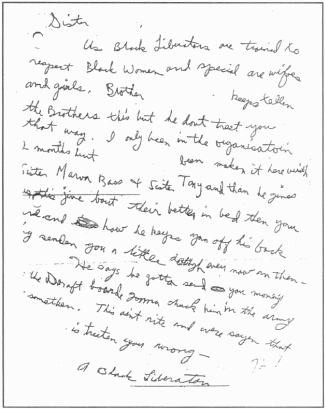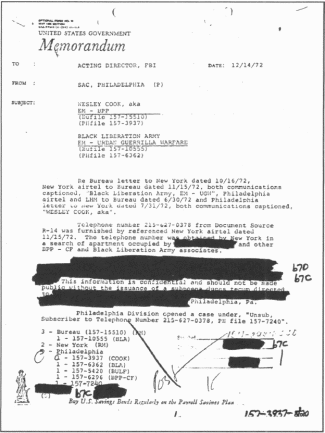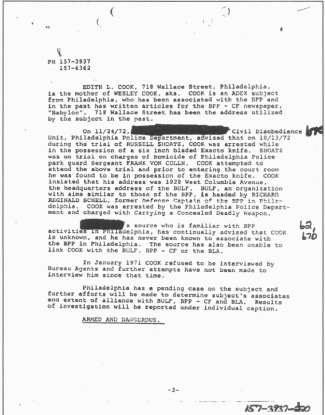The main function of the party is to awaken the people and to teach them the strategic method of resisting the power structure.
-- Huey P. Newton [1]
UPON REFLECTION, IT would appear somewhat unlikely that Huey P. Newton would be the prime mover in the formation, development, and construction of a revolutionary group like the Black Panther Party.
An intense, shy, small-framed man, preacher's son, small-time thief, street tough, pretty boy, illiterate, and, years later, Ph.D., and, still later, drug addict, Newton was a man of endless complexity whose character oscillated between the brilliant and the nihilistic.
As a youth, Huey hated to leave his house, because older boys would pick on him and call him names. In a revealing discussion with his former partner and one-time head of the BPP, Elaine Brown, the private Huey emerges as a man consumed with fear:
"A lot of what I am has to do with fear," he said to me out of nowhere one of those first nights I came to see him in Oakland. ''And what I understand about fear. I wasn't afraid only in the Soul Breaker. Like you, I've been afraid much of my life."
"You know, niggers on the street don't like 'pretty niggers,'" he continued, making me wonder whether he was speaking about him or me.
"They called me 'pretty' and 'high yellow nigger' and other motherfuckers. The problem with niggers on the street, of course, is that they don't know what to hate for their oppression." [2]
To conquer his profound fear of the streets, Huey sought the counsel of his older brother, Walter, who schooled him with valuable insights into both street and life realities. Walter explained that the guy who seemed like the biggest bully was often the guy with the biggest fear. "He was probably more afraid than you," Walter reasoned.
The older Newton taught the younger how to walk, how to talk, and how to fight. In essence, he taught him to confront and to overcome his fear.
It worked, to a degree, but Huey would confide to Elaine, "I was still scared every day." [3]
He countered that fear by becoming the aggressor:
Every blood on the street was a potential threat, unless I knew he was a friend. After my first fights, though, I recognized that they bled like me .... By the time I became a teenager, I was challenging the first fool that looked at me wrong, and walking around with an ice pick in a paper bag. [4]
Youngsters on the street were forced to look at the skinny pretty boy differently -- as "Crazy Huey." [5]
Those preteen rites of passage sank deep roots in the man, who learned important lessons about how the world worked. These terrifying yet trans formative years and core experiences may have taught Huey that things are not always what they seem: bullies are often cowards, fear must be confronted, force yields to force, and if one isn't a friend, fight him.
While Newton graciously credits his friend Bobby Seale with the co-founding and development of the Black Panther Party, it seems self-evident that the intense, driven, acutely brilliant, self-conscious, and mercurial Newton was the motivating force. Seale seems more peripheral in the endeavor.
To state the case quite another way, Huey was the active principle in their partnership. Huey was fire; Bobby was smoke. It seemed that while Bobby encouraged Huey, Huey inspired Bobby. Bobby may have acted as stable foundation for the fiery youth known as Crazy Huey. But if Huey had not existed, it seems unlikely that the Black Panther Party would have become the revolutionary, hard-edged, aggressive entity that it became, or perhaps even come into existence at all.
One of the first things done was to set forth a program, a statement of objectives for the group. With little variation, the set of objectives would remain in the form written by Newton in the first two weeks of October 1966. There is no question as to who wrote the lion's share of the text, for as Seale relates:
From the first of October to the fifteenth of October, in the poverty center in North Oakland, Huey and I began to write out a ten-point platform and program of the Black Panther Party. Huey himself articulated it word for word. All I made were suggestions. [6]
This short set of ideas would be memorized, recited, and taught by tens of thousands of Party members, across the nation and around the world, for over a decade.
The 10-Point Program
The list of ten major objectives was split into two sections, in a form that brought to mind the long printed section of the Nation of Islam's newsweekly, Muhammad Speaks, entitled "What We Want -- What We Believe." In it we see the thought process and concerns of the twenty-four-year-old Newton, as well as his hoped-for objectives:
October 1966 Black Panther Party Platform and Program What We Want What We Believe
1. We want freedom. We want power to determine the destiny of our Black Community.
We believe that black people will not be free until we are able to determine our destiny.
2. We want full employment for our people.
We believe that the federal government is responsible and obligated to give every man employment or a guaranteed income. We believe that if the white American businessmen will not give full employment, then the means of production should be taken from the businessmen and placed in the community so that the whole of the community can organize and employ all of its people and give a high standard of living.
3. We want an end to the robbery by the capitalist [*] of our Black Community. (*in the original text, the term "white man" was used; it was changed shortly thereafter to "capitalist"]
We believe that the racist government has robbed us and now we are demanding the overdue debt of forty acres and two mules. Forty acres and two mules was promised 100 years ago as restitution for slave labor and mass murder of black people. W/e will accept the payment in currency which will be distributed to our many communities. The Germans are now aiding the Jews in Israel for the genocide of the Jewish people. The Germans murdered six million Jews. The American racist has taken part in the slaughter of over fifty million black people; therefore, we feel this is a modest demand that we make.
4. We want decent housing, fit for shelter of human beings.
We believe that if the white landlords will not give decent housing to our black community, then the housing and the land should be made into cooperatives so that our community, with government aid, can build and make decent housing for its people.
5. We want education for our people that exposes the true nature of this decadent American society. We want education that teaches us our true history and our role in the present-day society.
We believe in an educational system that will give to our people a knowledge of self. If a man does not have knowledge of himself and his position in society and the world, then he has little chance to relate to anything else.
6. We want all black men to be exempt from military service.
We believe that Black people should not be forced to fight in the military service to defend a racist government that does not protect us. We will not fight and kill other people of color in the world who, like black people, are being victimized by the white racist government of America. We will protect ourselves from the force and violence of the racist police and the racist military, by whatever means necessary.
7. We want an immediate end to POLICE BRUTALITY and MURDER of black people.
We believe we can end police brutality in our black community by organizing black self-defense groups that are dedicated to defending our black community from racist police oppression and brutality. The Second Amendment to the Constitution of the United States gives a right to bear arms. We therefore believe that all black people should arm themselves for self-defense.
8. We want freedom for all black men held in federal, state, county and city prisons and jails.
We believe that all black people should be released from the many jails and prisons because they have not received a fair and impartial trial.
9. We want all black people when brought to trial to be tried in court by a jury of their peer group or people from their black communities, as defined by the Constitution of the United States.
We believe that the courts should follow the United States Constitution so that black people will receive fair trials. The 14th Amendment of the U.S. Constitution gives a man a right to be tried by his peer group. A peer is a person from a similar economic, social, religious, geographical, environmental, historical and racial background. To do this the court will be forced to select a jury from the black community from which the black defendant came. We have been, and are being tried by all-white juries that have no understanding of the "average reasoning man" of the black community.
10. We want land, bread, housing, education, clothing, justice and peace. And as our major political objective, a United Nations-supervised plebiscite to be held throughout the black colony in which only black colonial subjects will be allowed to participate for the purpose of determining the will of black people as to their national destiny.
When in the course of human events, it becomes necessary for one people to dissolve the political bands which have connected them with another, and to assume, among the powers of the earth, the separate and equal station to which the laws of nature and nature's God entitle them, a decent respect to the opinions of mankind requires that they should declare the causes which impel them to the separation.
We hold these truths to be self-evident, that all men are created equal; that they are endowed by their Creator with certain unalienable rights; that among these are life, liberty, and the pursuit of happiness. That, to secure these rights, governments are instituted among men, deriving their just powers from the consent of the governed; that, whenever any form of government becomes destructive of these ends, it is the right of the people to alter or to abolish it, and to institute a new government, laying its foundation on such principles, and organizing its powers in such form, as to them shall seem most likely to effect their safety and happiness. Prudence, indeed, will dictate that governments long established should not be changed for light and transient causes; and accordingly, all experience hath shown, that mankind are more disposed to suffer, while evils are sufferable, than to right themselves by abolishing the forms to which they are accustomed. But, when a long train of abuses and usurpations, pursuing invariably the same object, evinces a design to reduce them under absolute despotism, it is their right, it is their duty, to throw off such government, and to provide new guards for their future security.
This simple list of objectives gave Panthers in whatever part of the country they found themselves, the basis for organizing and working with a broad cross-section of the community-for students, the platform's point five would apply; for prisoners, point eight; and so on.
The full platform and program, usually accompanied by a photo of Newton bearing a shotgun, would be reprinted in every issue of The Black Panther newspaper and would be foremost in the minds of every person who joined the Party.
Beyond Program
The 10-Point Program, required to be memorized by people joining the Party, reflects the nationalist origins of the Party and the positions articulated by Malcolm X before his assassination. Many of the points also reflect Huey's intense study of and fascination with the law, as evidenced by his citations of the US Constitution, a verbatim excerpt of the Declaration of Independence, and his call for a UN-supervised plebiscite.
But the program, while central to the Party, was not the ideology of the Party; it was more of an organizing tool. It was a way of getting folks to think about change, and it proposed solutions to problems faced by Black folks across the nation.
What was the ideology of the Black Panther Party?
It depends on which period of its existence, for the Party was always in a process of development and change.
While the Party, as we have seen, began as a staunchly nationalist formation, following in the footsteps of Malcolm, other external influences forced a re-evaluation of those earlier positions.
Cultural Opponents
In the Party's earliest days, the opponents of the Newton-led Black Panther Party for Self-Defense came from the Black Panther Party -- of Northern California! This formation was a nationalist one, but opposed the BPPFSD's stance on weapons on the grounds that the Oakland group was prematurely paramilitary. It proposed a more political, as in electoral, orientation. The Oakland group replied with Mao's dictum, "Political power grows out of the barrel of the gun." [7] Oakland confronted the San Francisco-based group, and by the end of 1967, the Frisco group dissolved. Some joined their former rivals. Others simply ceased their activities. [8] Another San Francisco-based group, Black House, co-founded by the well-known, newly sprung Eldridge Cleaver, was more attracted to cultural affairs than political affairs. Among its most prominent supporters were Black playwrights Amiri Baraka and Ed Bullins. Another playwright, Earl Anthony (who later admitted he was a snitch!), noted that the Black House was "most critical" of the Black Panther Party for Self-Defense and opposed their politics. [9]
The Black Panther Party confronted their opposition with its usual audacity. Armed Panthers entered the Black House headquarters and ordered its members evicted. They left the premises, and the BPPFSD "occupied" the site. [10]
The Party's early conquests made it ill equipped for the conflicts with the United Slaves (US) organization, headed by the Black scholar Maulana "Ron" Karenga. While the Party had easily absorbed or neutralized opposition in the Bay Area, it had trouble when it tried to expand into Los Angeles. The US organization had grown in the wake of the Watts Rebellion and had assembled a group of young men trained in self-defense techniques, called Simba Waehuka (Young Lions in KiSwahili, an Eastern and Central African language). The young men were fiercely loyal to Karenga and even dressed in imitation of their leader, with bald heads and clistinctive Fu Manchu-style mustaches. Earl Anthony, who had joined the Party in Oakland, was invested with the rank of captain and sent to Los Angeles to organize a BPP chapter. Unknown to the Party however, Anthony was a paid informant for the FBI. In fact, in furtherance of the Bureau's mission, he worked feverishly to sabotage and worsen relations between the newly emergent Los Angeles Panthers and the US organization. While posing as a loyal captain of the Black Panther Party, Anthony was reporting to his FBI handlers every conversation of consequence and providing valuable intelligence about the inner workings and weaknesses of both the BPP and the US organization. The FBI wanted conflict between the two groups, and Anthony slavishly complied.
Despite Anthony's duplicity and due in a large part to the work of Alprentice "Bunchy" Carter, a native of Los Angeles and the Deputy Minister of Defense of the city's chapter, who relied upon his old ties with the notorious Slauson street gang, the Panthers were soon able to organize a strong chapter.
What began as a territorial conflict quickly developed into an ideological one.
The US organization had developed a significant power base in both the Black Congress (a gathering of black groups in LA) and at the University of California at Los Angeles, where a struggle was brewing over who would be named director of the new Black Studies Program. Carter and his Panther ally, Deputy Minister of Information Jon Huggins, were both students of UCLA's High Potential Program, and both were angling to have influence on the choice of director of the Black Studies Program. The director could become a powerful source of political and ideological influence in the Black intellectual community. Karenga, however, was equally determined to have a say in the outcome.
Despite the Party's relative novelty in the city, and perhaps because of it, the Panther delegates were gaining influence and support both on campus and in the greater community. When meetings offered no solution that the two groups could agree on, two US members opted for the final solution to the persistent Panther problem. They shot Bunchy and Jon to death on January 17, 1969.
M. Wesley Swearingen, an FBI agent who worked in the Los Angeles racial squad, was told that the FBI used t\vo of its informants, George and Larry Stiner, who were members of the US organization, to kill Bunchy and Jon. Swearingen has written about the informant who made this data public:
Darthard Perry, a self-admitted and publicly acclaimed informant for the FBI, flied an affidavit in a Black Panther Party lawsuit against the government charging that he knew that the United Slaves members who were responsible for the murders of the Panthers were FBI informers. Perry claims that the murders committed by the Stiner brothers, who were convicted and sent to jail in 1969, and their subsequent escape in the 1974 prison break from San Quentin, were engineered by the FBI. I then discovered the unthinkable, that FBI informants had actually been instructed by FBI agents to assassinate several other Black Panther members.
As of 1992, the Stiner brothers were still listed as fugitives. Either the FBI has disposed of the Stiners or they are in the FBI's Witness Protection Program. I know that Darthard Perry was an FBI informant and that he is telling the truth about the FBI. [11]
The slaying of Bunchy and Jon left the field open for the US organization to control the UCLA post. It left it also with considerable political problems, as both slain Panthers were seen popularly as martyrs who gave their young lives in defense of the Revolution and the Party. The US organization won the battle, so to speak, but lost the larger war, as the Party grew in the hearts of people, both in Los Angeles and across the nation.
The assassinations of Bunchy and Jon condemned the very notion of cultural nationalism for the Party; it became anathema. The Party tried to purge old ideas that seemed similar to it. In the newspaper, adherents were derided as "pork chop nationalists." The Party suspected members of the US organization were paid agents of the State, and opposed both their ideological positions and their political stances. Huey would be critical of the tendency, calling it:
[R]eaction [to] instead of responding to political oppression. The cultural nationalists are concerned with returning to the old African culture and thereby regaining their identity and freedom. In other words, they feel that the African culture will automatically bring political freedom. Many times cultural nationalists fall into line as reactionary nationalists. [12]
What the conflict also did was serve as a catalyst for further thinking and ideological development. The US organization conflict was a spur for the Party to look at alternatives to the empty Africanisms that were expressed by the cultural nationalists' wearing of African dress, the adoption of African names, and the acquisition of a smattering of KiSwahili. While the idea of revolutionary nationalism held sway for a time, it had to give way to a kind of revolutionary internationalism. This was only logical, given the persuasive international and ideological influences that the Party leadership was exposed to.
Revolutionary Internationalism
The Party, and its top leaders, influenced as they were by the West Indian psychiatrist Dr. Frantz Fanon; modern China's revolutionary founding father, Mao Tse-Tung; Latin America's martyred "Che" Guevara; Ghana's Kwame Nkrumah; and others, saw internationalism as a natural, logical development from the increasingly co-opted nationalism of the period. This co-optation could perhaps be best seen in Richard Nixon bizarrely proclaiming "Black Power!" as he endorsed his notion of Black capitalism. [13]
The Party looked to liberation struggles and revolutions around the world as inspiration and guidance for the Revolution that would one day emerge in the heart of the United States. All around the world, people were fighting for their freedom from foreign, usually colonial, domination. Africa, Asia, and Latin America were ablaze with the fiery light of rebellion. They seemed like external counterpoints to Watts and Newark. In the so-called First World, students, veterans, women, and Blacks were loudly and openly challenging the repressive and well-oiled machinery of the status quo.
As campuses became places of challenge and as the antiwar movement began to swell in the streets with the well-to-do and white working class, the Black Panther Party heard echoes of anti-imperialist resistance from almost every quarter.
The Revolution seemed as inevitable as tomorrow's newspaper headlines.
As a direct result of its increasing internationalism and the heightening conflicts with State forces, many of the Party's leading members sought refuge abroad. Eldridge Cleaver, facing attempted- murder charges stemming from the April 1968 shoot-out in Oakland in which Party treasurer Bobby Hutton was killed and fearing certain assassination in prison, clandestinely made his way to Cuba. Captain Bill Brent, an associate from Cleaver's prison days, would hijack a plane to Cuba where he remains to this day. National Field Marshal Don Cox would arrive at the Party's international headquarters in Algiers in March 1970. Shortly thereafter, his pregnant wife would join him there. New York Panthers Sekou Odinga and Larry Mack, escaping the mass arrests crippling New York's leadership through the infamous Panther 21 case, would hijack a plane to Guinea and then make their way to Africa's northern coastal city of Algiers by June 1970. Odinga would later welcome his bride and twin sons to the offices there. Former Panther 21-accused Michael "Cetawayo" Tabor, and his wife, Newton's personal secretary, Connie Mattl1ews, went to live in Algiers in spring 1971.
By the fall of 1974, even Huey ewton himself would begin his life in exile, as he fled the threat of several outstanding felony charges by making a new home in Cuba's countryside. The founder of the Black Panther Party would not return to the US for three years.
For many Panthers, revolutionary internationalism meant the option of refuge from the repressive apparatus of the State.
But revolutionary internationalism was more than securing a safe haven. This ideological stance meant supporting liberation movements in their struggle against the US imperialists. For the Party's information chief, this meant communicating, as directly as possible, with those fighting for the Empire, and trying to convince them to battle against US imperialism.
The Party's paper ran a provocative letter penned by Eldridge Cleaver entitled, "Letter to My Black Brothers in Vietnam." In it the Minister of Information appealed to Black soldiers directly, explaining that they shouldn't fight against the Vietnamese, who weren't the enemies of Black folks. Rather, Black soldiers sent to Vietnam should "start killing the racist pigs who are over there giving you orders." [14]
This internationalist stance perhaps saw its most extreme expression in the controversial "Pilots for Panthers" program, when the Party offered to trade imprisoned Panthers for captive US Army soldiers and officers in the custody of the National Liberation Front of Vietnam (NLF). A famous photo was published in The Black Panther featuring a well-tanned BPP Minister of Information, Eldridge Cleaver, accompanied by four members of the NLF above the caption: "In Solidarity Against A Common Enemy-the NLF of South Vietnam and the Black Panther Party FF [Freedom Front] Babylon." [15] It was classic Eldridge.
Yet their revolutionary internationalism wasn't always on the receiving end. Newton did more than offer a POW exchange with the Vietnamese. He offered an undetermined number of Black Panther troops to aid the Vietnamese in their struggle against the US Empire. Indeed, the Deputy Commander of the South Vietnamese People's Liberation Army, Nguyen Thi Dinh, accepted the offer and, in a letter to BPP leadership, wrote: "With profound gratitude, we take notice for your enthusiastic proposal; when necessary, we shall call for your volunteers to assist US." [16]
This revolutionary internationalist position was echoed in other work done by Cleaver, who announced BPP support for the Palestinian struggle, and, in response to a query about the Party's position on Al Fatah, declared, "We support them. Absolutely! And revolutionaries all over the world. We see our battle as one and the same -- a fight against imperialism and capitalism -- and that fight can't be divided." [17]
Weeks later, Cleaver would appear publicly with Al Fatah's head, Yasser Arafat, at a support conference. [18]
While Al Fatah and BPP officials took advantage of this powerful propaganda opportunity, it was but another expression of revolutionary internationalism. In an interview with CBS news reporter Richard C. Hottelet, Fatah's Algerian representative, Abu Bassem, announced that Ai Fatah's high command accepted his recommendation to train Black Panthers in urban guerrilla tactics and sabotage. According to Hottelet, Bassem said, "When the time comes, the Panthers will carry out quick and deep strikes in the United States, assassinations of men responsible for the policy of discrimination from high levels to low, and sabotage to factories and capitalist institutions." [19]
Although it is doubtful that this training ever occurred, in this era of revolutionary internationalism such rhetoric didn't seem extraordinary.
This revolutionary internationalism was more than merely skin deep, as may be seen in the educational materials that every Party member was expected to study. Panthers were expected to read these materials so that they could intelligently discuss issues at weekly Political Education (PE) classes and also to simply learn the science of revolution from those people who had lived it. Thus, almost every Panther had a personal copy of the Quotations from Chairman Mao Tse-Tung, known colloquially as the Red Book for its bright red plastic slipcover, and its Marxist-Leninist-Maoist (that is, red) orientation. The Red Book, featuring brief excerpts from the lengthy writings of Mao, was translated from Mandarin Chinese into clear, accessible English and thus had an enormous impact on the political development and ideological perspective of those Panthers with little formal schooling. A more challenging and perhaps even more significant text was Frantz Fanon's The Wretched of the Earth.
While Mao was influential, Fanon was inspirational, for we knew he was, above all things, a Black man, from the Americas, who was an integral part of a real-life revolution. Fanon, this son of Africa, was a Black man waging a war against imperialists in North Africa, with his mind and his hands. His words had a deep and abiding resonance for us. The importance of Fanon to Party members can be seen in the observations of a leading Central Committee member, Kathleen Neal Cleaver, who served in the Party's International Section in Algiers for several years. She termed his influence "profound":
The crucible of civil war forged the writings of Frantz Fanon, the Black psychiatrist from Martinique who fought alongside Algerian revolutionaries for independence from France. His books became available in English just as waves of civil violence engulfed the ghettoes of America, reaching the level of insurrection in the wake of the assassination of Dr. Martin Luther King, Jr. in 1968. Fanon died in 1961, a year before Algeria obtained the independence he had given his life to win, but his brilliant, posthumously published work The Wretched of the Earth became essential reading for Black revolutionaries in America and profoundly influenced their thinking. Fanon's analysis seemed to explain and to justify the spontaneous violence ravaging Black ghettoes across the country, and linked the incipient insurrections to the rise of a revolutionary movement. [20]
In explaining the power of Fanon's analysis, Cleaver illustrates why the Black Panther Party was not a civil rights organization, but a liberation organization, dedicated to revolutionary transformation rather than reformist window-dressing (otherwise known as the installation of "black faces in high places"):
The opening sentence of The Wretched of the Earth said, "National liberation, national renaissance, the restoration of nationhood to a people ... whatever may be the headings used or the new formulas introduced, decolonization is always a violent phenomenon." Fanon's penetrating dissection of the intertwining of racism and violence in the colonial scheme of domination was compelling to Blacks fighting in America; it provided a clearly reasoned antidote to the constant admonition to seek changes peacefully. Fanon explained how violence was intrinsic to the imposition of White colonial domination, and portrayed the oppressed who violently retaliate as engaged in restoring human dignity they were stripped of by the process of colonization. His analysis of the tortured mentality of the colonized person and the therapeutic nature of fighting to destroy colonial domination provided radical Blacks in America with deep insights-into both their own relationship to a world-wide revolution underway and to the profound kinship between their status in America and that of colonized people outside America. [21]
"Huey's Party"?
True to the patterns of Huey's youth, the Party chose to concentrate on the biggest bully on the block -- the United States. The Black Panther Party opposed the war, as did many, many others. Yet none of the antiwar groups went as far as to offer troops to the Peoples Republic of Vietnam, as did the Black Panther Party.
As the Party began to oppose nationalism, it took positions that reflected that perspective. If nationalism, per se, is wrong, then allegiance to the US nation is also wrong. Many of those in the antiwar movement were unprepared to take that next step.
That said, the antiwar movement was a burgeoning one that members of the government and the administration took seriously. Nixon aide Alexander Haig commented in an interview with the French journal Politique Internationale that, "There is a Jane Fonda on every doorstep." [22] Fonda, at the time a popular Hollywood actress, was reviled by some Veterans of Foreign War (VFW) types as "Hanoi Jane" because of her antiwar activism and trips to Vietnam. Haig's comment may reflect a governmental paranoia, but among activists the FBI was intentionally stoking paranoia. The FBI directed agents to "enhance the paranoia endemic in these circles and ... get the point across that there is an FBI agent behind every mailbox." [23]
The term "Huey's Party" arose when Big Bob Bay, one of Huey's personal bodyguards and a former Captain from West Oakland, became a personal emissary from Newton to the New York branch in the Bronx. Big Bob, as his name suggests, was a mountain of a man. He stood well over six foot four and tipped the scales at around 300 pounds. He didn't walk; he lumbered, from side to side, like a grizzly.
As one of Huey's oldest friends, and a dyed in-the-wool Panther, Big Bob regarded any deviation from proper Party ideology or form as more a personal than a political affront.
He became well-known among New York Panthers and dreaded for his fits of temper. He reflected an unbending allegiance to the Minister of Defense, and his countrified Californi-ese could be heard bellowing in offices throughout the five boroughs: "Nigga, I ain't lettin' you do nuthin' that'll fuck up this Party! Uh-Uhn! Not this Party, not Huey P. Newton's Party!"
Big Bob's reference was more than rhetorical, for, in fact, in essence, in people's heads, it was Huey's Party. He was the first Panther in the hearts and minds of his comrades.
We were molded in his image.
We read his words and tried to emulate his resistance.
This held true from members of the highest Party body, the Central Committee, to the lowest-level Panther-in-Training.
While this was not the Party's official position, it was how it lived in the real world.
That meant that Huey's political insights and developments became ours, to the extent that we could follow and understand them. When a major ideological shift was taking place, we followed it, even if we didn't particularly agree with it.
Huey had spoken -- period.
That almost-blind faith in the guidance of Newton would have serious and long-lasting repercussions.
People read The Black Panther extremely closely to follow ideological developments.
When papers came in from the airport, fresh from the Party's printers, we would take the time, either in the office or in the field, to read the paper so that we wouldn't be caught sleeping. We never knew when a political opponent would try to engage us in ideological argument, so we had to be ready to defend the Party's positions. That meant we had to read our paper, preferably before we sold it to others. It also meant that we should read the publications of other groups to allow us to see where they were coming from. That habit came in handy to one young Panther assigned to paper-selling duty in a bustling section of the Bronx:
The 3rd Avenue El in the Bronx was a major thoroughfare in the borough, and as such was a prime site for one trying to sell The Black Panther. I had recently been assigned to the Bronx office and in an attempt to sell my fifty copies, I chose a stop on the line where the foot traffic would be quite heavy, as people descended from the elevated train ride. At roughly the same time, another young Black man elected to stop at the busy corner with the intention of selling his wares.
His wares were essentially the same as mine -- newspapers. There, however, the similarity ended, for it was clear from his product that competition was inevitable.
The young man wore a dark-green iridescent suit and a brightly colored bow tie. His hair was cut close to his scalp in the "hustler" style, with a thin part cut in, his face shaved hairless. He carried with him a multi-colored plastic shopping bag that appeared to be filled with copies of Muhammad Speaks.
As I surveyed his wares, he was surveying mine. We looked at each other and understood that neither would relinquish the corner to the other. And so, we began selling in earnest. Shouts of 'Help us Free Huey!" mingled with "Salaam Aliekum, brother!" as we struggled to sell our product.
"Yho, brother! Find out what's happenin' that the white power structure ain't gonna tell ya! Check out The Black Panther -- only a quarter!"
"Salaam Aliekum, Sister! Come on back to your own! Read Muhammad Speaks! Twenty-five cents!"
For nearly an hour the sales continued, fed and famished by the flow of passersby debarking from the trains hissing to a stop overhead. After a while, we got into a conversation:
"Brother, you got to get with the Honorable Elijah Muhammad, and stop following those devils like Marx and Lenin and 'em. "
'Well, bro ' -- you should get with the Minister of Defense, Huey P. Newton, and the Black Panther Party."
"You should follow a Black man, brother, not some Jews like Marx and Lenin!"
'We revolutionaries, brother, and we study about revolutionaries from around the world. We don't care what race they is."
"I can see that, brother," glancing at a copy of The Black Panther, pointing to the cover picture of an Asian, full-haired man, "Who is that, brother?"
"That's Kim Il-Sung, the leader of North Korea, and a revolutionary."
"You see what I'm saying, brother? Here you go talking 'bout another guy! He ain't got nothin' to say to Black people, brother!"
"Well, if that's so, brother, why he in yho paper Muhammad Speaks?"
"What you talkin' 'bout, brother?" he asked, seemingly stunned by the question. I read and studied his paper quite regularly, for its layout, news, and commentary, but I doubted if he ever read any of ours. This seemed only logical for someone assigned to the East Coast Ministry of Information office, and I remembered reading this week's issue of Muhammad Speaks.
"Check it out, brother, in yho international news section."
In disbelief, he turned the pages until, sure enough, an article appeared bearing a photo of Kim Il-Sung. He looked at it, and then turned to me smiling.
"Yes, sir, brother. Yessir. Um-humm."
"And what we learned from him was the idea of Juche, a Korean word that means self-reliance!" [24]
To the average Panther, even though he worked daily in the ghetto communities of North America, his thoughts were usually on something larger than himself. It meant being part of a worldwide movement against US imperialism, white supremacy, colonialism, and corrupting capitalism. We felt as if we were part of the peasant armies of Vietnam, the degraded Black miners of South Africa, the fedayeen in Palestine, the students storming in the streets of Paris, and the dispossessed of Latin America. As Huey Newton refined the ideology from revolutionary internationalism to intercommunalism these feelings of solidarity continued.
More than any other Panther, the work of Eldridge Cleaver seemed to prove this theory beyond question.
The BPP Abroad
In July 1969, leading members of the Black Panther Party, led by Minister of Information Eldridge Cleaver, attended a Pan-African Cultural Festival in Algiers. Algeria would become home for the beleaguered Cleaver, who fled the US a year before to avoid a return to prison that he was convinced would result in his assassination. Out on bail for charges stemming from the April 6, 1968, shoot-out (which left the teenage Hutton dead and Cleaver wounded), the Party's information chief had traveled around the world, his FBI wanted poster his initial "passport," in his lonely exile from his American homeland. On behalf of the Party, Eldridge went to Beijing and to North Korea's spartan Pyongyang with a media delegation.
The Algerian government, its memory still fresh of its own brutal struggles under French colonialism, looked on the Cleaver delegation with favor. An official international headquarters was established in 1970 which had all the trappings of an embassy. An embassy not on behalf of the US government, or even the American people, but a symbol of an independent Afro-America with the Black Panther Party in a representative capacity for the growing Black liberation movement.
Kathleen Neal Cleaver, Party Communications Secretary and Eldridge's wife, would later write of the office's impressive functions and scope:
When the delegation returned to Algiers in September, the International Section of the Black Panther Party was formally opened. The Panthers invited representatives of all the liberation movements and socialist states to their villa, inaugurating their official establishment within the revolutionary diplomatic community in Algiers. The villa became a kind of embassy of the American revolution, receiving visitors from all over the world. Bur the Panthers found themselves essentially limited to serving as an information center, conveying news about revolutionary developments within the United States to their associates in Algiers and receiving information from all the movements represented in Algiers. The International Section of the Black Panther Party, however, turned into a magnet for an increasingly diverse crop of fugitives from the United States. [25]
The establishment of the international section in Algiers marked a coup for Eldridge just as the release on bail of Huey P. Newton on August 5 marked a major victory stateside. These events were high points of the Black Panther Party as a bona fide revolutionary organization of global import, and were the high watermark, too, of the American Black liberation movement. But all the news wasn't golden for Huey's Party. In July of 1969, the deeply negrophobic director of the FBI, J. Edgar Hoover, called the Panthers "the greatest threat to internal security of the country" [26] and those words were having a chilling effect.
The comments came from a man now known as a virulent, racist anti-Semite, for his career was based on deep, perpetual fear-mongering that played quite well among American nativists. Hoover's almost half-century of dominance by fear, subterfuge, and official criminality, reflected his powerful status as head of a de facto "ministry of internal security" that routinely ran roughshod over a slew of criminal and constitutional laws. [27]
When he spoke those words, however, they were far more than the dark obsessions of one old, somewhat twisted man; they reflected the aims of a powerful government agency that was created in his narrow and white supremacist image -- the FBI.
Things were going well for the Party, and it was growing by leaps and bounds.
Things were going so well that they had to get worse.

